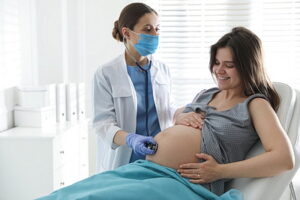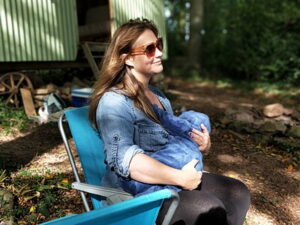
The COVID-19 vaccine rollout started in December 2020, but there have been reservations about the immunization of pregnant and breastfeeding women since then; however recently, the CDC has shared evidence that supports the safety and effectiveness of the COVID-19 vaccination for women who fall into these categories. Here, we share some insight into what you need to know about the COVID-19 vaccine for pregnant and breastfeeding women.
The COVID-19 Immunization for Pregnant and Breastfeeding Women
The overall risk of severe illness due to COVID-19 is low for healthy individuals as well as those who have been vaccinated. However, pregnant women have a much higher risk of contracting a more severe illness compared to women who are not pregnant and may include the need for hospitalization and intensive care. Additionally, it may also mean that you may need a ventilator or special equipment to breathe, and there is a significantly higher risk of death.
Furthermore, pregnant women with the COVID-19 virus also have an increased risk of preterm birth as well as other pregnancy-related complications compared with pregnant women who do not have the disease.
Immunization is critical for breastfeeding mothers, as there is evidence that mothers can pass on the antibodies to their children through breast milk. However, the data is limited to women who have received the mRNA (trains cells how to make a protein that triggers an immune response). vaccine only.
FAQs About COVID-19 Vaccine for Pregnant and Breastfeeding Women
 Let’s look at some of the FAQs related to the COVID-19 vaccine for pregnant and breastfeeding women.
Let’s look at some of the FAQs related to the COVID-19 vaccine for pregnant and breastfeeding women.
1. Should Pregnant and Breastfeeding Women Receive the Covid-19 Vaccine?

The CDC strongly recommends the immunization of pregnant and breastfeeding women. Since pregnant women are considered a high-risk group that can contract severe COVID-19 illness, it is best for them to receive immunization. The recommendation for immunization is valid for both pregnant and breastfeeding women as well as for women who are planning to get pregnant soon and are actively trying to conceive.
2. Is the Vaccine Available for Pregnant Women?
The vaccines are available for both pregnant and lactating women. As of May 2020, only 16% of the pregnant women in the U.S. received at least one dose of the COVID-19 vaccine. The number has risen up to 23% by August 2021. Moreover, more than 200,000 pregnant women have received an initial dose of the mRNA vaccine without experiencing any major side effects or specific safety concerns.
3. Is the Vaccine Safe for Lactating Mothers?
Based on the available data, the COVID-19 vaccine is considered safe for breastfeeding mothers. While there is limited research, one thing is for sure that the mRNA vaccines do not contain live viruses. Hence, being vaccinated with an mRNA vaccine does not pose a risk to the baby.
In addition, there is evidence that breastfeeding women who have received mRNA vaccines can pass on the antibodies to their young ones through breast milk. Hence, COVID-19 is not only safe for mothers and protects them against the virus but is also effective in keeping breastfeeding kids safe and healthy.
However, this is only the case with the mRNA vaccine. There is limited evidence on how other formulas for the COVID-19 vaccine may affect the lactating child.
4. Does COVID-19 Vaccine Affect Fertility?
One of the critical concerns for women who are planning to get pregnant in the near future or are actively trying to conceive is how the vaccine will affect their fertility. Given the data we have so far, there is no evidence of COVID-19 immunization affecting your fertility. Hence, according to the latest research, if you are planning to get pregnant or are trying to conceive, there are no reasons to delay your pregnancy due to COVID-19 immunization.
5. How Immunization Affects Pregnant Woman’s Immune System?
The vaccine is designed to activate the immune system response so the body can fight a viral infection. The immunization’s mode of action works exactly the same as for a person who is not pregnant.
6. Does the COVID-19 Vaccine Increase the Risk of Miscarriage?
A relatively recent study indicates that there is no change in the risk of miscarriage during the first trimester among women who received the Pfizer, Moderna, and Johnson & Johnson vaccines. However, more research is still required to determine how the COVID-19 vaccine can change the risk of miscarriage for pregnant women.
7. Can I Get COVID-19 Following the Immunization?
You may experience mild, temporary side effects following the immunization. However, you can still get the infection following the immunization but you are less likely to get a severe illness, and there is likely to be a lesser need for hospitalization. There have been exceptions about the severity, although rare, so you may want to speak with your medical professional prior to getting vaccinated.
COVID-19 Vaccine Safety and Effectiveness for Pregnant and Breastfeeding Women
So far, there is limited evidence about the safety and effectiveness of COVID-19 vaccinations for pregnant and breastfeeding women. However, the data is growing. Given the CDC’s data so far, the benefits of COVID-19 immunization outweigh all potential risks associated with vaccination during pregnancy and lactation.
According to the first data released by the CDC regarding the safety of receiving an mRNA vaccine during pregnancy, there is no increased risk of miscarriage among pregnant women who received an mRNA COVID-19 vaccine in the U.S. Moreover, a recent study from Israel compared pregnant people who were immunized through an mRNA COVID-19 vaccine with those who did not. The data showed that the vaccination lowers the risk of severe infection from the COVID-19 virus.
Furthermore, there is evidence that the antibodies produced in a pregnant mother’s body after getting an mRNA vaccine were also found in umbilical cord blood, which may protect the fetus against the virus.
The trials on finding the safety and effectiveness of COVID-19 vaccines for pregnant and breastfeeding mothers as well as those who are planning to get pregnant are still underway. The next few months are critical as they will help researchers assess the data and find out more about the safety and effectiveness of the COVID-19 vaccine for pregnant and breastfeeding women.
Since we have been exposed to this virus for close to two years now, more definitive results have been determined, but many are still fully inconclusive. With that said, it is best to follow the studies that are homogeneous and not those that contradict each other. Additionally and perhaps most important, consult with your physician on the best route to follow based upon your particular metabolism and health.
